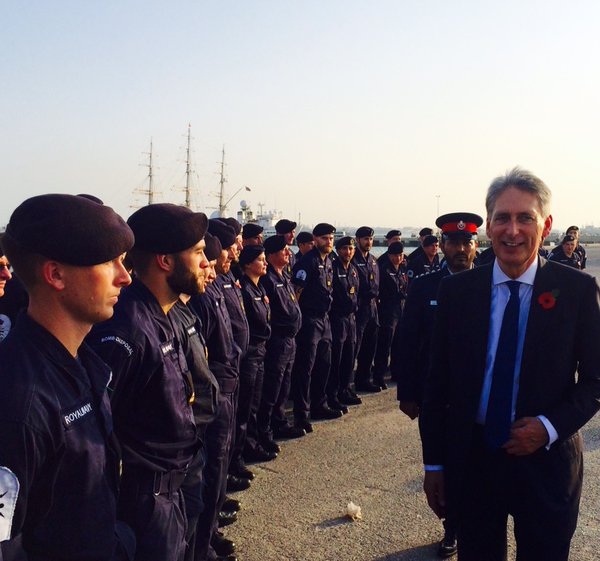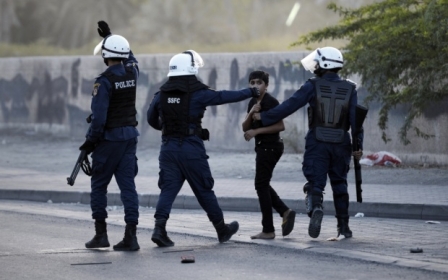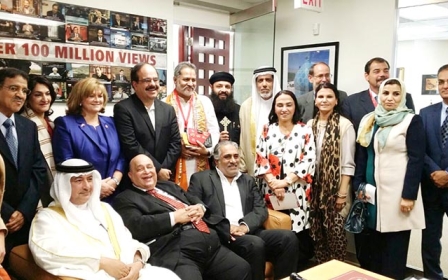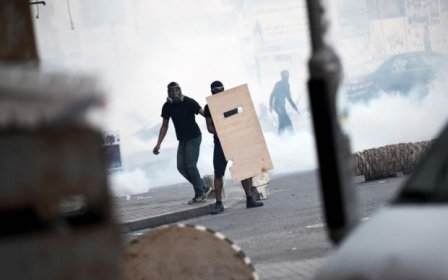Questions raised over legality of new UK base in Bahrain

The governments of Bahrain and the UK have celebrated the start of construction on a new British naval base in the tiny Gulf kingdom, amid allegations that the site is being built in violation of Bahrain’s constitution.
UK Foreign Secretary Philip Hammond led a British delegation over the weekend to take part in a ground-breaking ceremony at the site on the eastern coast of the island kingdom, just next to an existing US naval base.
Hammond heralded the start of construction at the site as a “watershed moment in the UK’s commitment to the region”, according to a statement issued by the Foreign Office on Saturday.
“The new facility will enable Britain to work with our allies to reinforce stability in the Gulf and beyond,” he said of the site, which lies about 240 kilometres across the Gulf from Iran.
But one exiled member of the Bahraini parliament told Middle East Eye that he had concerns about the legality of the base, because the project had not been discussed in parliament.
“There is a big question mark over the constitutionality of the project,” said Jawad Fairooz, an opposition activist now based in London.
According to Article 37 of Bahrain’s 2002 constitution, any treaties “relating to state territory, natural resources [or] rights of sovereignty” must be made after consultation with the parliament rather than being handed down by the king as decrees.
However, according to Fairooz, the Bahraini parliament had as yet not been consulted on the project.
“Using the land of Bahrain for a foreign base is certainly related to the country’s sovereignty – not to mention the fact that some of the budget is being spent on the base,” he said.
HMS Juffair, named after a colonial-era British base in the country, is scheduled to open in the autumn of 2016.
Bahraini Foreign Minister Khalid bin Hamad Al Khalifa, whose government is contributing an undisclosed amount to the $23m construction costs, welcomed a British delegation that included Alan Duncan, a member of parliament for the UK's governing Conservative Party, for the ground-breaking ceremony.
Duncan is also chair of the Conservative Middle East Council and took part in the Manama Dialogue, a regional security conference hosted by the International Institute for Strategic Studies in the Bahraini capital over the weekend.
In comments on the sidelines of the Manama Dialogue, Duncan said that the naval base was a “strong illustration of the United Kingdom’s commitment to Bahrain”.
Duncan also praised a package of reforms undertaken by Bahrain’s ruling family since a series of pro-democracy protests began in 2011.
The uprising, part of the Arab Spring protests that shook the region in 2011, saw hundreds of thousands of people take to the streets to demand greater political freedom and an end to the monarchy.
The state's reaction to the protests has been described as "violent" by Amnesty International - all in all at least 40 people were killed, including demonstrators and some members of the security forces.
Since then the government has embarked on a raft of political reforms including giving the elected lower house of parliament greater powers to scrutinise policy. However, many campaigners have criticised the reforms as not going far enough.
“Amazing progress has been made by the Bahraini government since the troubles of 2011. Those who criticise Bahrain perhaps need to be more informed before speaking about the country,” he was quoted by the state news agency as saying in an article published on Monday.
Duncan, who in 2009 was paid £2,000 ($3,090) by the Bahraini government to visit the country, also promised that “anyone in the UK criticising Bahrain unfairly” would “find us telling the truth loudly back at them”.
“The greatest misconception about Bahrain is the concept of a 'second class Shia citizen’,” Bahrain’s state news agency quoted him as saying.
“This is nothing but a false perception. From what we have seen, Bahrain is a strong example of different ethnicities living in harmony and tolerance.”
Jailed for tweeting
Pro-democracy activists in Bahrain, many of whom are, unlike the ruling family, from the country’s Shia majority, complain that despite the reforms, freedom of expression remains severely curtailed, with leading figures jailed in recent months over tweets expressing their political opinions.
In June opposition leader Fadil Abbas was given a five-year jail term for “publishing false news” after tweeting criticism of Bahrain’s participation in a Saudi-led bombing campaign in Yemen.
“Those who tweet about critical issues will be targeted. It’s not easy to express your view openly in Bahrain nowadays,” Bahraini opposition activist Jawad Fairooz told Middle East Eye.
Fairooz, a former Bahraini MP who now lives in exile in the UK, said restrictions on freedom of expression explained the lack of open domestic opposition to the new base.
“We don’t even have free media so that people can express their opinion.”
Bahrain’s Interior Ministry could not be reached for comment regarding the allegations.
New MEE newsletter: Jerusalem Dispatch
Sign up to get the latest insights and analysis on Israel-Palestine, alongside Turkey Unpacked and other MEE newsletters
Middle East Eye delivers independent and unrivalled coverage and analysis of the Middle East, North Africa and beyond. To learn more about republishing this content and the associated fees, please fill out this form. More about MEE can be found here.




